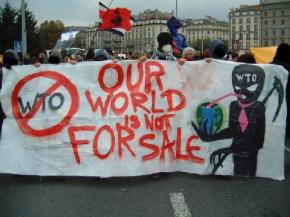Don’t cry for Doha
explains how the latest breakdown of the World Trade Organization's Doha round of negotiations reflects a shift in power between the industrialized countries and developing nations.
THE COLLAPSE of the Doha Round last week is a big failure for the poor countries of the world, they tell us. The capitalist media is mourning the failure of World Trade Organization (WTO) to liberalize world markets, and has doubts about the future of the WTO as an organization. It was the poor countries that stood to benefit the most, they claim, and the failure to progress will only worsen the situation of the world's poor.
But is this true? Was the Doha round, and the WTO, really looking out for the world's poor, or simply furthering the interests of First World corporations? A simple look at the details of the trade negotiations is revealing, and shows us that we should be grateful, not sad, for the failure of the WTO to achieve progress in its free trade agenda.
"The collapse of the seven-year effort to further reduce trade barriers is regrettable, not least because it aimed to increase the access of the poorest countries to rich-country markets," complained one New York Times article about the collapse of the Doha Round last week.

"It is a big setback, particularly to the hope of smaller and poorer developing countries," said another.
But the truth of the matter is that the developing countries didn't stand to benefit much at all, especially considering that their number one demand, the removal of massive agricultural subsidies in the U.S. and Europe, was not even going to be addressed. As Bolivian President Evo Morales pointed out, "the agricultural subsidies in the North, which mainly go to agricultural and food companies in the U.S. and Europe, will not only continue but will actually increase, as demonstrated by the 2008 farm bill in the United States."
Beyond that, the so-called increased access for developing countries to First World markets didn't really amount to much either. As Robert Weissman of the Multinational Monitor pointed out, the greater access for poor countries would "increase developing country income in total by $16 billion a year--less than a penny a day for every person in the developing world."
SO IF the poor countries didn't stand to benefit, who did? After all, these talks were called the Doha Development Round since they were supposed to be concerned with economic development for the poor countries. As a BBC news report explained, "The Doha Development Round initially started in 2001 with the aim of remedying inequality so that the developing world could benefit more from freer trade."
But this was hardly unselfish generosity on the part of the rich countries. What the WTO trade negotiations really aimed to do was lower trade barriers in the Third World so that companies in the global North could expand exports. As a bargaining tool, they tell the poor countries that they will lower barriers to Third World imports, and allow them to export more of their production to the North.
But this is actually the opposite of what the underdeveloped world needs. After all, forcing poor countries to lower protection from First World imports essentially prevents them from being able to promote industrialization in their own countries, and forces them to remain dependent on imported goods. And since the developing countries wouldn't be able to use the tools they need to industrialize, open markets in the North would mostly be enjoyed by agricultural producers, relegating the poor countries to remain primarily agricultural exporters.
Not only is this the very opposite of economic development for the poor countries, it actually harms them, turning them into exporters of a few agricultural goods for First World markets, while at the same time millions of their own people starve.
It is exactly these kinds of policies that have made much of the Third World dependent on imported foods, the main culprit behind the ongoing world food crisis. As award-winning food and trade policy analyst Devinder Sharma explains:
In the past 30 years, and thanks to the trade liberalization polices being perpetuated, 105 of the 149 Third World Countries have turned food importers. Some 40 years ago, developing countries were actually exporting food and had a surplus of $7 billion in food trade. Now the developing countries food deficit has grown to a record $11 billion a year. A successful completion of the ongoing Doha round in its present form would turn the entire Third World into a food dump.
The last thing the poor countries need to do is open their economies to more imports from the developed nations. But that was exactly the goal of these WTO negotiations. First World industries, at a time of great economic uncertainty, are pushing to expand exports abroad to stay afloat. Despite the rhetoric, this was the WTO's main intention.
And now the failure of the Doha Round to further open world markets has many worried about international trade--and wondering if the WTO itself is becoming obsolete.
"The WTO's reputation as a forum for negotiation will suffer from the Doha breakdown," reported Forbes.com, which went on to warn that the "WTO rules could become increasingly irrelevant."
Many of the Third World nations seemed to be waking up, and no longer willing to accept the demands of the free-trade imperialists in the U.S. and Europe. Commentators in the North are expressing concern that it may become harder to roll back Third World protectionism, and expand markets for First World exports. The power of the North to shape and control world trade relations might be decreasing.
"A long period of stalemate in international trade relations may now lie ahead," warns Forbes.com.
For the sake of the world's poor, let's hope they are right.


